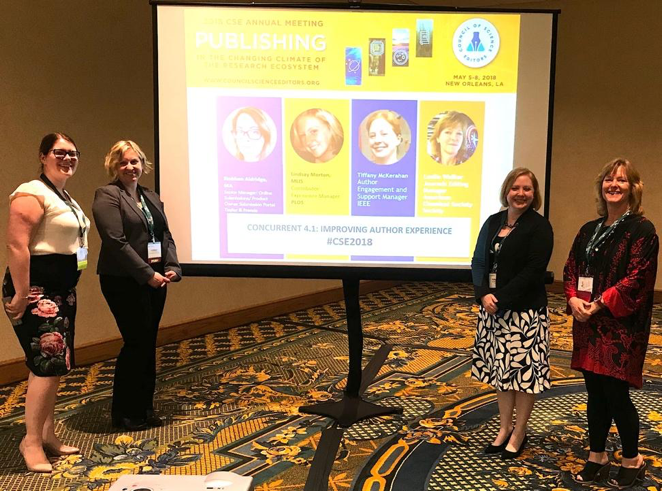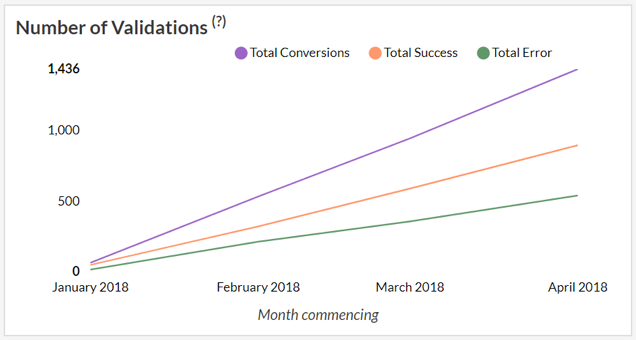MODERATOR:
Alison McGonagle-O’Connell
Collaborative Knowledge “Coko” Foundation
San Francisco, California
https://orcid.org/0000-0002-9032-3983
SPEAKERS:
Siobhan Aldridge
Agile Product Owner
Taylor & Francis
Milton Keynes, United Kingdom
Lindsay Morton
Contributor Experience Manager
Public Library of Science
San Francisco, California
Tiffany McKerahan
Author Engagement and Support Manager
IEEE
New York, New York
Leslie Walker
Director of Global Production Operations
American Chemical Society
Columbus, Ohio
REPORTER:
Alison McGonagle-O’Connell
Collaborative Knowledge “Coko” Foundation
San Francisco, California
https://orcid.org/0000-0002-9032-3983
As publishers continue to shift toward viewing researchers and authors as customers, it is important to continually assess the ways in which various stakeholders implement improvements to the author experience. At this year’s CSE Annual Meeting, within a session titled “Improving Author Experience,” 4 publishers shared the ways they are using technology to make researchers’ interactions with the publishing process less cumbersome, and possibly even pleasant. The session included overviews of Taylor and Francis’ Author Submission Portal, PLOS Author Services’ integration with bioRxiv, IEEE’s LaTeX Analyzer, and American Chemical Society’s ACS Direct Correct (Figure 1).

Siobhan Aldridge, Agile Product Owner for Taylor & Francis’ Submission Portal, presented on the sleek, branded front end they have created atop the Editorial Manager Ingest Service. This allows authors to submit to all Taylor & Francis/Routledge journals from one, easy-to-use interface that collects their work on a dashboard where they can see real-time updates from the peer-review system that underpins the portal. Authors never need to interact with the underlying peer-review systems, and editors do not need to change their workflows or learn a new system to accommodate the portal.
Lindsay Morton, Contributor Experience Manager at the Public Library of Science (PLOS), presented on an integration that allows authors to opt in to automatically post a preprint of their manuscript on bioRxiv as part of initial submission to PLOS. The process leverages custom submission questions within Editorial Manager. Although the automatic deposit service began in May 2018, integration with preprint servers is not entirely new to the PLOS workflow. PLOS has been accepting direct transfers from bioRxiv since 2016, and has welcomed manuscripts with posted preprints as far back as 2001. “Preprints are relatively new to the life sciences and we are pleasantly surprised that the uptake rate is around 20%,” said Morton. “We believe uptake will increase as authors better understand the benefits of preprints. We are encouraged by the positive feedback and will continue to pursue workflows that ease the author experience.”

Tiffany McKerahan, Author Engagement and Support Manager at IEEE, discussed the IEEE LaTeX Analyzer, a tool the publisher developed in collaboration with Overleaf, which is openly available for anyone to use. The analyzer allows authors to quickly scan their LaTeX files, whether produced in Overleaf or another program, and assess whether there are any errors that would cause downstream delays or typographic errors during the production process. The tool flags errors and offers suggestions for addressing them, allowing authors to fix errors before submitting and to feel confident their LaTeX article will render correctly. “So far, so good!” said McKerahan of both the tool’s update and impact in workflow. She presented a chart showing, as of the presentation in early May, the number of successful first-time validations, thrown errors, and conversions (Figure 2).
Leslie Walker, Director of Global Production Operations group, presented the American Chemical Society’s ACS Direct Correct. ACS Direct Correct is an author service devised to enhance author experiences with ACS Publications by providing an alternative way to enter proof corrections and comments directly in the edited manuscript file. The tool leverages HTML to display a clean, readable rendition of the proof to the author and an HTML-based interface handles queries and comments. The underlying XML is preserved and updated accordingly based on the author’s input and the information gathered within ACS Direct Correct is reviewed and recomposed for final publication by ACS journal production staff. “Over 90% of authors who have used ACS Direct Correct reported that it was ‘easy to use’ within a survey. More importantly, nearly 100% of them confirm they will use ACS Direct Correct the next time they are publishing in an ACS journal,” said Walker.
Perhaps as an indication of the urgency of the topic, the session was well attended by over 60 participants. Q&A was lively, and social media was abuzz with observations from the session.
“I am thrilled that Siobhan, Lindsay, Tiffany, and Leslie were all able to present within this session,” said Alison McGonagle-O’Connell, session organizer. “They, and the publisher tools they represent, were all on my ‘A’ list when organizing because the problems that each tackle, in different points within the author’s interaction with the publication process, are unique, and the solutions each represents are powerful. The author response data, in each case, underscore this.”
Links to Presentations
- https://www.councilscienceeditors.org/wp-content/uploads/4.1-Aldridge.pdf
- https://www.councilscienceeditors.org/wp-content/uploads/4.1-Morton.pdf
- https://www.councilscienceeditors.org/wp-content/uploads/4.1-McKerahan.pdf
- https://www.councilscienceeditors.org/wp-content/uploads/4.1-Walker.pdf
